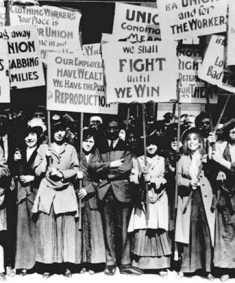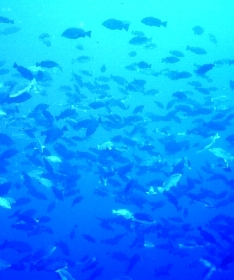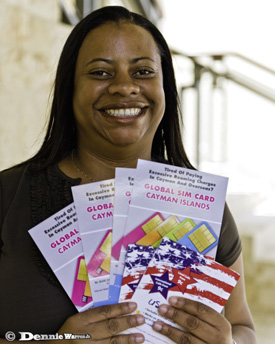Archive for March 8th, 2011

Women still vulnerable to abuse and inequality
 (CNS): Despite many achievements in the field of gender equality, women in Cayman, in common with those around the world, are still more likely to be poor and vulnerable than men as well as face abuse and discrimination, the community services minister has said. Speaking at a special ceremony celebrating the 100th anniversary of International Women’s Day,Mike Adam said the day served as a powerful reminder that empowering women and girls requires continued vigilance, dedication and commitment. He also pointed out that women’s participation in the political arena was not equal to that of men and more had to be done to empower local women.
(CNS): Despite many achievements in the field of gender equality, women in Cayman, in common with those around the world, are still more likely to be poor and vulnerable than men as well as face abuse and discrimination, the community services minister has said. Speaking at a special ceremony celebrating the 100th anniversary of International Women’s Day,Mike Adam said the day served as a powerful reminder that empowering women and girls requires continued vigilance, dedication and commitment. He also pointed out that women’s participation in the political arena was not equal to that of men and more had to be done to empower local women.
“The National Assessment of Living Conditions Study indicates that the female population in the Cayman Islands is more likely than the male population to be among the poor and vulnerable,” Adam stated in his address at the Westin on Tuesday morning (8 March). “Furthermore, in many jurisdictions, as well as ours, women and girls remain the overwhelming victims of domestic abuse, sexual assault and other forms of exploitation.”
Talking about female participation in the country’s political arena, he said we see inequality there as well. He added that since 1997, when Deputy Premier Juliana O’Connor-Connolly became the first female appointed as a minister, there has never been more than one female minister in Cabinet at any given time, and from 2005-2009 there were no female ministers.
“These facts signal to us that we must continue to uphold women’s rights and strengthen our efforts to ensure that we put in place proper programmes, policies and legal mechanisms to advance and uplift our women and girls,” he added.
Having passed the Protection Against Domestic Violence Law last year, which redefines domestic violence, expanding it beyond physical abuse to include sexual, financial, emotional and/or psychological abuse, he said further legislation was on the agenda to assist in the equality of the sexes.
Adam said that the Gender Equality Bill, 2011 is to be heard on Cabinet’s agenda this month and be brought to the Legislative Assembly this year – though he did not say when.
“This piece of legislation will be the most significant move in a very long time towards addressing gender equality issues in the Cayman Islands,” the minister stated. “The bill offers protection against gender discrimination on the basis of sex, marital status, and pregnancy. It covers issues such protection from gender discrimination in employment, training and recruitment; promotes equal pay for equal work; provides protection from sexual harassment in the work place, and other related matters.”
He explained that once this piece of legislation was in place, the Cayman Islands Government would then be able to make a request to the United Kingdom for the Convention on Elimination of All Forms of Discrimination Against Women (CEDAW), an international bill of rights for women, to be extended to Cayman.
“The extension of CEDAW would be a move to further strengthen the rights of women and girls in the Cayman Islands,” Adam said. “I must also remind each person that outside of any legislation or mandate to protect women, we have a moral responsibility to continue to strive for gender equality. Women play key roles in maintaining the social fabric of our community and strengthening our economic prosperity, and we must never forget that.”
 A special poster was also unveiled at the ceremony celebrating 100 years of International Women’s Day.
A special poster was also unveiled at the ceremony celebrating 100 years of International Women’s Day.
Meanwhile, the WHO Director-General, Dr Margaret Chan, delivered a message listing the social and legal reforms that had improved the state of women’s health around the world but noted that maternal mortality rates and HIV rates among young women were still too high, tobacco consumption among women is increasing, sexual and other forms of gender-based violence continue to be widespread, and there is an increasingly heavy burden of non-communicable diseases on women.
The theme this year, "Equal access to education, training and science and technology: Pathway to decent work for women", focuses on some basic determinants of women’s health.
“The direct and indirect ways that gender inequality prevents women of all ages from realizing their human right to health requires action now,” Chan stated. “Education and training equip girls and women with skills needed to protect their health but social norms deny many the chance to attend and complete primary and secondary levels of education. This negatively affects fertility and smoking rates and HIV prevention, and is associated with increased risk of experiencing sexual and other forms of gender -based violence.” She said involving women in health research and technology development ensures that medical advances do not jeopardize their health and ensures equal benefits from these advances.
“When women benefit from decent work conditions they are more likely to benefit from social protection measures such as employer-based health insurance, maternity benefits, occupational health and safety measures — all factors that improve access to health care and health outcomes,” Chan said, adding that when women and girls didn’t have equal access to these determinants of health, education, employment and health the systems have failed them.

Project tracks endangered ‘baby fish’ on first journey
 (CNS): Researchers working at the Reef Environmental Education Foundation (REEF) have launched a new website which is tracking this year’s Nassau grouper larvae as it makes its first journey through the treacherous oceans around the Cayman Islands. Baby Grouper Adrift! shows the results of state‐of‐the‐art satellite drifter research being conducted as part of the Grouper Moon Project, a collaborative research effort between REEF and the Department of the Environment (DoE). Working with scientists from Oregon State University, the Adrift project aims to better understand where the endangered grouper larvae will end up after being spawned – a key part of learning more about the fish and how to help protect them.
(CNS): Researchers working at the Reef Environmental Education Foundation (REEF) have launched a new website which is tracking this year’s Nassau grouper larvae as it makes its first journey through the treacherous oceans around the Cayman Islands. Baby Grouper Adrift! shows the results of state‐of‐the‐art satellite drifter research being conducted as part of the Grouper Moon Project, a collaborative research effort between REEF and the Department of the Environment (DoE). Working with scientists from Oregon State University, the Adrift project aims to better understand where the endangered grouper larvae will end up after being spawned – a key part of learning more about the fish and how to help protect them.
The scientists say that these endangered fish seem to choose the worst imaginable place in the ocean -cold and deep, with big waves meshing over the convergence of strong currents- to spawn on winter nights. They now hope to answer questions about why there and what is the importance of such places.
“For a long time, scientists thought fish spawned at these sites to spread larvae all over. Recent evidence, however, suggests that fish spawn at these sites, and at certain times of the day and tide cycle, in order to keep larvae close to home,” officials from REEF said.
With everyone wondering where the Cayman grouper larvae will end up through the Grouper Moon Project research efforts, visitors to the Adrift website can follow the larvae in real time as they complete a 45‐day ocean journey, and with any luck, make it back to Cayman’s coastal areas to settle and grow.
The researchers released satellite‐linked drifter buoys to track the eggs released at a Nassau grouper spawning site this season on the Island of Little Cayman. The Adrift webpage features a map that continually updates the location of these drifters as they are taken by the ocean currents along the potential route grouper larvae may take as they grow large enough to settle on the reef.
Once the larvae are a few days old they are able to move up and down in the water so they may be affected by different currents which means that the drifters can only estimate the likely route with their final destination still any one’s guess. As a result visitors to the website are being asked to do just that and submit a guess where they think the drifters will end up with the closest guess winning a prize.
The primary objective of the Grouper Moon Project is to evaluate the importance of Nassau grouper spawning aggregations to local fisheries and coral reef ecosystems. Little Cayman in the Cayman Islands is home to one of the last known, and largest, spawning aggregations of the endangered Nassau grouper.
For ten days following winter full moons, thousands of large grouper meet at known reef sites for short periods of time (days to weeks) and release their gametes in massive spawning bursts. Since 2002, REEF and DoE have coordinated annual efforts to monitor and study the Little Cayman Nassau grouper aggregation. The project has grown in scope to include an ambitious acoustic tagging research project, juvenile habitat and genetics studies, and oceanographic connectivity research.
For more information please visit the REEF website and click here to go toBaby Grouper Adrift!

Two more charged over cash shop heist
 (CNS): A 28 year old woman and a 26 year old man have now been charged in connection with a suspected robbery at a money transfer store in George Town earlier this year. Police have already charged two other men, aged 19 and 21 years, with theft, conspiracy to steal and possession of an unlicensed firearm concerning what is believed to have been a staged hold up at the Reggae Money Express at Elizabethan Square on Saturday 15 January. Police said today Tuesday (8 March) that the 26 year old man was charged with accessory after the fact and possession of criminal property and the 28 year old woman with interfering with a criminal proceeding and theft.(Photo Dennie Warren Jr)
(CNS): A 28 year old woman and a 26 year old man have now been charged in connection with a suspected robbery at a money transfer store in George Town earlier this year. Police have already charged two other men, aged 19 and 21 years, with theft, conspiracy to steal and possession of an unlicensed firearm concerning what is believed to have been a staged hold up at the Reggae Money Express at Elizabethan Square on Saturday 15 January. Police said today Tuesday (8 March) that the 26 year old man was charged with accessory after the fact and possession of criminal property and the 28 year old woman with interfering with a criminal proceeding and theft.(Photo Dennie Warren Jr)
Both of them were scheduled to appear in summary court Tuesday afternoon.
On the evening of the incident police said that they had received a report of a robbery only yards from the police headquarters which is also located in Elizabethan Square, at around 6pm.
Police were told that a man had entered the premises with what was believed to be a firearm, threatened staff and made off with a sum of cash. No shots were fired no-one was injured in the incident. Later that evening, following a police operation in the George Town area involving uniform, CID and armed officers, two men were arrested.

Globalization and the Body of Christ
The value of any religion is how it stands the test of time. And it is Christianity which shows the greatest ability of any religion to conform to the 21st century. I have already written on the parallels of evolution and the doctrine of Creation. And again, as I see the effects of globalization all around us, I wonder why nobody notices the similarities it has with another certain Christian doctrine?
In what follows, we will examine the close relationship between globalization and the Body of Christ, so that Christians can better understand their faith, and so that non-Christians (for if they choose to not believe in something, they must know what it is they do not believe in) can better understand it too.
What is the doctrine of the Bodyof Christ? Quite simply, it is the process by which the human race becomes one body. As the human race populates, and humans live in greater communion with each other, Christ’s body grows and builds itself up. “From him the whole body, joined and held together by every supporting ligament, grows and builds itself up in love, as each part does its work” (Ephesians 4: 15 – 16). The formation of Christ’s body is a massive under-taking that will require “a great multitude that no one could count, from every nation, tribe, people and language” (Revelation 7: 9). Christ’s body covers the entire human race, from the deepest past to the farthest future, so that all things and all people are in someway incorporated into (or rejected from) the Body of Christ. “The body is a unit, though it is made up of many parts; and though all its parts are many, they form one body. So it is with Christ” (I Corinthians 12: 12).
Christ’s body extends to these parameters because he is “before all things, and in him all things hold together” (Colossians 1: 16 – 17). Most people only think of Jesus as an individual Jew who lived in Israel some 2,000 years ago. Yet Jesus is, and always has been, a lot more than this. Like Voltron, who is formed when various robots unite together, Christ came to “unite all things in him” (Ephesians 1: 10). When he “has put everything under his feet” he will hand everything over to the Father “so that God may be all in all” (1 Corinthians 15: 26 – 28). So for a Christian, God will fully dwell with humanity when Christ’s body (the unity of the human race) is achieved. In short, the entire history of the universe is the formation of Christ’s body.
Of course, you can probably already see the parallels that those scriptural passages have with globalization. Globalization is quite literally the unification of the human race happening before our very eyes. Today, more than ever before, the nations and people of the earth are converging on each other in all domains of life: geographically, economically, culturally, religiously etc. Never before has humanity been so aware of itself ‘as a whole:’ we realize that we form one community on this earth. The United Nations, World Bank, and other global governing bodies have been formed because of this awareness. “Global” is the new buzzword. The Internet and social sites like Facebook further highlight the connectedness of the human race. On a daily basis, the human race is being driven towards greater unity and inter-connectedness with itself – a reality that reflects precisely the doctrine of the Body of Christ.
This drive towards greater unity is increasing humanity’s knowledge and awareness: which for a Christian is a spiritual awakening. God is truth. We stand on a tower of knowledge passed on by those before us, and which we are passing on to those after us. The founder of Wikipedia explains it like this: "Imagine a world in which every single person on the planet is given free access to the sum of all human knowledge. That's what we're doing.” Human knowledge accumulates over the centuries and becomes more accurate and refined. We thought the earth was flat, now we know that it is round. We thought the earth was the center of the universe, now we know it actually circles the sun. We thought the universe was ready-made in 7 days, now we see that it evolved over millions of years.
The Scientific Revolution of the last 150 years was brought about by globalization (sharing of knowledge), and it is essentially a Spiritual Revolution, even though most of us do not think of it that way. But the fact remains that the Scientific Revolution has given birth to enormous amounts of knowledge and very spiritual technology. Cell-phones, the Internet, GPS technology, are all spiritual objects. They provide instant knowledge on just about any subject, and immediate communication with anybody, anywhere – all in the palm of our hands. Look at your phone, the energy and complexity of it; can you not feel spirit radiating from it? Many of us first find out what is happening on the island through our Blackberries, Facebook or CNS. Through this technology we can communicate with people who are not even near us – it used to be thought that only angels could do that. As globalization continues, we can only expect knowledge /spirit to grow exponentially, which is consistent with the doctrine of the Body of Christ.
However, great evil can be borne out of globalization (indeed it already has), but ironically this is yet another reason that proves its similarity to the Body of Christ. Christianity is clear that as Christ’s body forms, someone else’s body is also forming: the anti-Christ’s. The Christ cannot come without the anti-Christ. The anti-Christ is any nation, people, or person, who hates the unity of the human race, and works against it. Whereas Christ stands for human unity and life, the anti-Christ stands for human disunity and death. All the knowledge and technology we listed above can be used for anti-Christ-like evil purposes: war, the nuclear bomb, global warming, anti-social behavior, loss of privacy, to name just a few.
Never before has the concept of the anti-Christ been as popular as it is today: for every one of us can see the potential for some future dictator who will force everyone “to receive a mark on their right hands or on their foreheads, so that they could not buy or sell unless they had the mark” (Revelations 13: 16 – 17). So much hate and so much evil, it seems that globalization is not destined to happen in peace and harmony, but only through sweat, blood and tears (and here, coincidentally, we glimpse the mystery of why Christ had to suffer and die.) As human beings, we decide whether to love and live in harmony with our neighbours, or to hate and wage war against them.
The Christ and the anti-Christ stand on our horizon. We can forecast weather and perhaps one-day control it as Christ did (Luke 8: 22 – 25), or we can destroy the earth’s ecological balance and deplete its natural resources (anti-Christ). We can cure diseases and mental ailments like Christ did (Matthew 17: 14 – 20), or we can create viruses and neuroses meant to destroy each other (anti-Christ). We can provide food and water to the whole earth as Christ fed the multitude (Mark 6: 35 – 44), or we can sit idle and allow our fellow human beings to starve (anti-Christ). Will the human race find unity, or will it destroy itself?
That question remains to be answered, but my intent here was only to show people that the Christian religion is more relevant than they realize. Far from dying a slow death, Christianity seems to be positioning itself to be the religion of the future. The reason Christianity is seen as a “bronze aged myth” is because it is still interpreted as if it is the Bronze Age. If Christianity is eternal as it claims to be, then it is must be relevant in every generation, and as I have pointed out, it is definitely relevant in our generation. In the 21st century, it is Christianity alone that offers an explanation of globalization, while the rest of the world is only watching the phenomenon unfold without the slightest idea of what it means. One must either accept that the Christian faith predicted the phenomenon of globalization 2,000 years ago, or have to dismiss the similarities as “coincidence.” I know that many will call it “coincidence,” yes, but Christians can boast and call it “prophesy” – a lot more satisfying, and encouraging to our faith. It is no longer hip, nor reasonable, to say that Christianity is a “bronze aged myth” when it has proven time and again to be the most legitimate belief (or lack of belief) system out there.

US concerned over financial crime in Cayman
 (CNS): The United States government has raised concerns about financial crime in the Cayman Islands in volume two of the 2011 International Narcotics Control Strategy Report (INCSR) published this month by the State Department. The document says that in Cayman most “money laundering is primarily related to fraud and drug trafficking” but because of its status as a zero-tax regime, the State Department said, the jurisdiction is "also considered attractive to those seeking to evade taxes” in their home countries. The report further criticises the Cayman Islands about the very low number of successful prosecutions for financial crime and money laundering that have taken place here given the size of the financial sector.
(CNS): The United States government has raised concerns about financial crime in the Cayman Islands in volume two of the 2011 International Narcotics Control Strategy Report (INCSR) published this month by the State Department. The document says that in Cayman most “money laundering is primarily related to fraud and drug trafficking” but because of its status as a zero-tax regime, the State Department said, the jurisdiction is "also considered attractive to those seeking to evade taxes” in their home countries. The report further criticises the Cayman Islands about the very low number of successful prosecutions for financial crime and money laundering that have taken place here given the size of the financial sector.
"While the country has increased both its regulatory and law enforcement staffing, the number of prosecutions and convictions is extremely low, given the vast scale of the country’s financial sector," the report stated, adding that only six successful prosecutions for money laundering and only one in the last four years have taken place.
In addition, the report said, the "lack of penalties" for failing to report ownership and identity information "undermines the effectiveness” of these obligations. "This is a problem in particular for an estimated 3,000 unregulated mutual funds resident in the Cayman Islands," said the INCSR, which noted that there appeared to be no requirements for companies, trusts and partnerships to retain records for at least five years.
However, recent legislative changes to a number of the laws relating to the offshore sector have addressed the reporting issue, which was also flagged by the IMF in its recent review.
The report goes on to urge the Cayman Islands to continue computerising various registrations, such as those for mutual funds. There is "a need to pay greater attention to the risks and proper supervision of non-profit organisations," the report states.
Listing Cayman as a “jurisdiction of primary concern” alongside countries such as Afghanistan, Luxembourg, Nigeria, Switzerland, the United Kingdom and the United States, the authors of the report explain that countries are categorized based on transactions involving significant amounts of proceeds from crime and not the jurisdiction’s legal framework to combat money laundering.

Calling cards slash costs
 (CNS): Former political candidate and local businesswoman, Sandra Catron, has begun a new local service that cuts rates for international calls on cell phones to a fraction of the current cost. Global SIM cards offer incredibly cheap rates for people making and receiving overseas calls or those who are using their cell phones when overseas. The SIM cards, which give the user a US and a UK global number, have been on the world market for almost a decade but Catron is the first person to bring them to the Cayman Islands. They can be used in any unlocked mobile phone and after a one-off fee for the SIM card, international calls are then a fraction of the rates of local cell phone providers. Catron said she did a lot of research on the types of SIMs available before bringing them to Cayman. (Photo Dennie WarrenJr)
(CNS): Former political candidate and local businesswoman, Sandra Catron, has begun a new local service that cuts rates for international calls on cell phones to a fraction of the current cost. Global SIM cards offer incredibly cheap rates for people making and receiving overseas calls or those who are using their cell phones when overseas. The SIM cards, which give the user a US and a UK global number, have been on the world market for almost a decade but Catron is the first person to bring them to the Cayman Islands. They can be used in any unlocked mobile phone and after a one-off fee for the SIM card, international calls are then a fraction of the rates of local cell phone providers. Catron said she did a lot of research on the types of SIMs available before bringing them to Cayman. (Photo Dennie WarrenJr)
“I’m very excited about the product and thus far the response from the local market indicates that it’s something that is long overdue and a welcomed addition to the market,” she said in the wake of the card’s arrival in Cayman.
With access to two numbers in one card, users can receive calls on either of those numbers so family, friends and business associates overseas can now call you without paying an international fee, and calls made when you are overseas are slashed.
“You can travel to 160 countries and be accessible no matter where you are. When you travel, especially to North American and Europe, you realize savings of up to 90% on roaming rates,” she added.
Customers receive a packet that contains the pre-paid global SIM card and all information they will need. “It’s 1 SIM with two numbers,” she said. “One UK (global number) and one US number that can receive calls from anywhere in the world. The SIM works in any unlocked GSM phone and users activate the SIM online or from the handset and then add minutes as needed.”
The cards cost $35.00 with a $10.00 bonus at top-up. “It’s pre-paid so people only pay for what they need. They have the option of paying 50 cents per month so their US number never expires.
Price comparison on roaming from the states to Cayman in US$:
AT&T International Roaming Rates for Cayman: $1.69 – $2.29
T-Mobile: $1.99
Global SIM: 0.19-.49 cents/min (based on calling/receiving from the USA)
Roaming in the USA:
Lime: calling within the USA: 0.68/min
Digicel: 0.79/min
Global SIM: 0.09/min
Calling back to Cayman from USA:
Lime: 1.09/min
Digicel: $1.25/min
Global SIM: $0.09 to land lines and 0.59 for mobile
For more information email info@globalsim.ky
Tough prisons don’t work, says Manderson
(CNS): The chief officer of the Portfolio of Internal and External Affairs has said that “tough prisons do not make good prisoners, just tough prisoners” and they certainly don’t help with the problem of recidivism. With the country’s prison system coming under the spotlight as the numbers of people incarcerated grows, Franz Manderson has said that the portfolio is focusing on how to rehabilitate offenders and stop their criminal behaviour in order to tackle the high rate of repeat offending. He said the public needed to understand that the loss of liberty is the punishment and that when inmates are incarcerated they should not be mistreated by the system itself but given an opportunity to change their ways. (Photo: Prison cell at Northward courtesy of Cayman 27)
“We don’t send people to prison to be punished at the prison,” Manderson said. “The punishment is the loss of liberty. While inmates are incarcerated they should be given their basic rights.”
With the recent increase in crime there is a widely held misconception in the community that HMP Northward is a glorified hotel and that prisoners are not suffering as a result of being locked up. Having taken up the gauntlet of dealing with the prison system since the death of the former corrections commissioner William Rattray, Manderson says prisoners are by no means living in the lap of luxury at the country’s prison as is commonly believed.
He said that the prisoners are not and should not be cruelly treated because they are incarcerated. Manderson said there was a need to focus on rehabilitation and addressing the behaviour that led to people being involved in crime – not punishing prisoners more.
He explained that the goal is to use the time inmates spend in prison constructively to address the reasons why they offend and to give them the tools to help them lead a crime free life when they return to the community in order to try and reduce what are particularly high recidivism rates here in Cayman. He said that trying to make prisons tough simply does not work.
“I looked at some of the toughest prisons in the world and they did not make good prisoners, just tough prisoners who reoffend,” he said, pointing to Jamaica as an example. “Everyone agrees that the prison system in our neighbouring country is tough but this has not helped to reducecrime in that country,” Manderson added.
There is considerable evidence to support the chief officer’s position as prison reformers have said for many years that mistreating prisoners, holding them in over-crowded conditions or keeping them locked down does not act as a deterrent or ‘teach prisoners a lesson’, as is commonly believed. The theory that harsher prison treatment reduces inmates’ future criminal activity is not born out in study after study, despite the support of the public that inmates should be made to suffer hardships while they are incarcerated.
With a growing population of increasingly serious offenders at Northward, Manderson commended the prison officers for their success in keeping the violence inside the prison walls to an absolute minimum. With opposing gang members and suspects on remand who are believed to have tried to kill each other in the past, this is no mean feat. Despite the tensions in the secure unit, officers have succeeded in keeping the opposing gang members apart.
Although violence is a regular feature in many of the so called “tough prisons” around the world, the officers at Northward have maintained the peace in the general prison population as well, despite the cramped and sometimes difficult conditions. Manderson also said some credit had to be given to the prisoners, many of whom follow the rules and serve their time without wishing to cause further trouble.
With cuts in the civil service, the CO stated that some of the educational and rehabilitation programmes have unfortunately been sacrificed in order to maintain security, but he said that as a result of a number of training programmes the officers themselves will be involved in more prison rehab- programmes, along with the possibility of the formalisation of prisoner led educational and vocational programmes as well. Manderson also said the portfolio is currently exploring the possibility of apprentice programmes for the prison that will equip the young inmates especially with a full vocational qualification.
Manderson said when prisoners have finished their sentences they should be released into the community having addressed the reason why they went to prison in the first place. However, he said, there was a need for more secure housing and jobs on the outside to finish the rehabilitation process.
Kathryn Dinspel-Powell, the Deputy Chief officer in the portfolio who is working alongside Manderson to address the many challenges thrown up by the growing population, said that it is very hard for an offender to avoid their previous criminal lifestyle if, when they are released, they have no secure home and no way of earning a living.
“Two of the biggest problems faced by prisoners being released and the main reasons for the high levels of recidivism is a lack of stable housing and so few employers willing to take them on,” she said. “If you are sleeping rough and no way of earning a living, it’s hard to stay away from trouble.”
There is currently only one half-way house, which is run by an NGO, designed for those coming out of the prison system and transitioning back into the community, which, Dinspel-Powell said, had achieved a number of successful transitions of former inmates. When budgets allowed it, she said there was clearly a need for more stable places for prisoners to come out to because sending them out of Northward with no job and nowhere to live was essentially sending them back into crime.
Let’s join forces, says Miller
(CNS): The people who are opposing the dredging of the North Sound channel should join forces with those who are opposing the development of a commercial seaport in East End and vice versa, says the independent MLA for North Side. Ezzard Miller, who says he opposes the dredging of the North Sound for the channel and the creation of artificial islands, says there is common ground in the two campaigns and they will be all the more powerful as a joint force. “We need to find a way for everyone who opposes these projects to stand together,” Miller said. “Both are detrimental to our environment and neither can be justified on the grounds of being of benefit to ordinary Caymanians. These proposed projects need to be stopped by people power.”
Miller says that not only is he concerned about the risk to the Sandbar-Stingray City, and the dangers to the island from cutting the reef but he also said that the premier recently indicated that this project would now require financial input from government to complete some of the infrastructure related to the project.
“In his latest comments the premier spoke about the need to provide supporting infrastructure which probably means the public purse will be paying for the causeway,” Miller added. He said it was interesting that the message that the channel was about creating a market for mega yachts and the economic benefits such an influx would bring has turned into the need to create two artificial islands and a new resort to make the project viable.
“It appears that government is going to allow investors to create several acres of prime waterfront real estate, the sale of which will not offer any benefit to Caymanians,” Miller noted. “We were led to believe that the channel was required to tap into the mega yacht market that we are supposedly missing, but now it seems the channel won’t be viable without creating these artificial resorts.”
The promised jobs for locals would also be few and far between, as is the case with the proposed development of the East End Seaport project, Miller noted. He pointed out that the dredging would take several years, and with no dredging firms in Cayman the developers would likely be using outside companies, who would use their own people.
“Whatever the long term prospects on either project, I see little if any benefit for Caymanians,” he added. “I don’t see any prospects for what we really should be doing, which is creating opportunities for middle class people here to develop their businesses.”
Miller also said the proposal to build an oil refinery in Cayman didn’t seem to make much sense either and doubted the claims that it will be zero emissions. “Even if it is possible to build a refinery that is ’green’ I dare say it would be extremely expensive and I don’t believe that it would go well with our tourism industry,” he added.

Farmers make important contribution, says minster
 (CNS): As the Cayman Islands prepares for the 44th Annual Agricultural on Ash Wednesday, 9 March, and the Cayman Brac show on Saturday, 12 March, the minister with responsibility for agriculture said the week would highlight the growing importance of the contribution farmers and other food producers make to the country and the economy. Although Cayman is unlikely to ever be able to feed itself, given the amount of available arable land and the demands of the population, government has said it is focused on increasing local production and increasing food security by supporting farmers in their efforts.
(CNS): As the Cayman Islands prepares for the 44th Annual Agricultural on Ash Wednesday, 9 March, and the Cayman Brac show on Saturday, 12 March, the minister with responsibility for agriculture said the week would highlight the growing importance of the contribution farmers and other food producers make to the country and the economy. Although Cayman is unlikely to ever be able to feed itself, given the amount of available arable land and the demands of the population, government has said it is focused on increasing local production and increasing food security by supporting farmers in their efforts.
Juliana O’Connor-Connolly said the week’s events would also serve to recognize farmers and other players who produce food locally. “We want the population to become more aware of the role of agriculture in national development; farmers do a great service in helping to feed our people and we must take time out to recognize their achievements,” she said.
Alongside the two shows this week, officials from the Department of Agriculture said two seminars are scheduled for Friday, 11 March, at the Stacy Watler Pavillion. Jamaica Drip Irrigation will make a presentation on irrigation methods and greenhouse technology, while the other seminar will be on the topic of pest control.
That same evening, the Cayman Islands Agricultural Society, alongside the Department of Agriculture and the Ministry of Agriculture, will stage an Agriculture Awards function to recognize prize-winning farmers from the Grand Cayman Agriculture Show.
Director of Agriculture Adrian Estwick said at the start of the week, “The two agricultural shows and the entire week of activities serve to remind the community that agriculture is not only alive but alsomaking an important contribution to the well being of the people throughout the Cayman Islands.”
See below for more details of shows.

CINICO in profit despite government debts
 (CNS): Even though it was owed well over $8 million by its main shareholder, the CI government, CINICO still managed to make a profit in the last financial year of over $3.5 million, according to its 2009/10 annual report. It is the second year that the government owned insurance company, which provides affordable insurance for those who are unable to gain health cover in the regular insurance market place, as well as for civil servants, pensioners and veterans, made a profit. The report, which was tabled in the Legislative Assembly last month and is now a public document, reveals, however, that next year CINICO is not expecting the profits to continue because of growing claims losses and a cut in the premium rates paid by government.
(CNS): Even though it was owed well over $8 million by its main shareholder, the CI government, CINICO still managed to make a profit in the last financial year of over $3.5 million, according to its 2009/10 annual report. It is the second year that the government owned insurance company, which provides affordable insurance for those who are unable to gain health cover in the regular insurance market place, as well as for civil servants, pensioners and veterans, made a profit. The report, which was tabled in the Legislative Assembly last month and is now a public document, reveals, however, that next year CINICO is not expecting the profits to continue because of growing claims losses and a cut in the premium rates paid by government.
According to the financial statement, the Ministry of Health paid $3.1 million of the $8.2 million it owes in August 2010, several months after the close of the financial year. Had government paid this CINICO would have exceeded its $5.8 million profit in 2009/08.
Auditor General Alastair Swarbrick said in his audit that $4.3 million of the $8.2 million relates to the 2008/2009 fiscal year and to settle it government would need to approve a supplementary budget in the Legislative Assembly.
During the financial year CINICO paid out almost $44 million in claims, over $4 million more than its pay outs in the 2008/09 financial year. 784 cases were referred overseas, which had increased from the previous year’s figure of 729. Of those overseas health case referrals most were for cardiovascular problems. The report also reveals that 33% of all claims made are for overseas treatment. The government company also stated that its net worth, as of 30 June 2010, was $12.5 million, up from just $190,000 two years earlier.
In the management statement CINICO said it expected a loss in the current 2010/2011 financial year as a result of growing local and overseas claims losses, as well as the lower premium rates being paid by the government.
“To compensate for the reduction in premium, the company will be intensifying its focus on claim losses and other expenses,” officials stated. The introduction of the proposed health facility by the Dr Devi Shetty hospital may decrease the number of overseas referrals in future but officials said it would not have an impact on CINICO for some time as the facility was planned over a 10-year period.
CINICO is one of only a handful of government companies that have managed to produce their annual report for the 2010 financial year end of 30 June almost within the 31 December 2010 deadline.